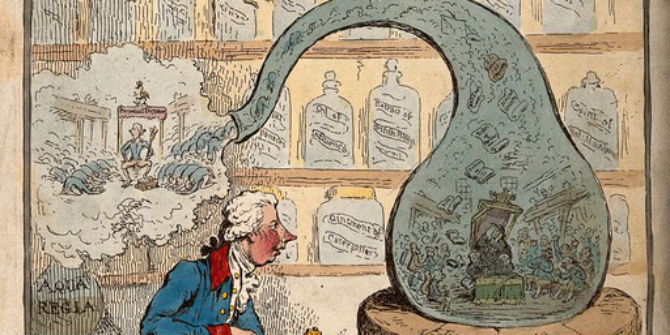
 Even now, with Brexit consuming Parliament, the question of whether we are suffering a constitutional or a political crisis is important, write Anand Menon and Alan Wager (The UK in a Changing Europe). Political crises are generally short-lived; constitutional crises represent a challenge to the system itself. A general election might be enough to push a deal through the Commons, but it would not necessarily fix the greater problem: the damaged political legitimacy of Parliament.
Even now, with Brexit consuming Parliament, the question of whether we are suffering a constitutional or a political crisis is important, write Anand Menon and Alan Wager (The UK in a Changing Europe). Political crises are generally short-lived; constitutional crises represent a challenge to the system itself. A general election might be enough to push a deal through the Commons, but it would not necessarily fix the greater problem: the damaged political legitimacy of Parliament.
What constitutes a political crisis? And when, and how, does a crisis of politics evolve into a crisis of the constitution? This might sound like an argument over semantics. Yet for political scientists, the distinction is an important one. This is because it can tell us what might happen next: a political crisis is solvable by politicians as gridlock – slowly – works its way through to a resolution. A constitutional crisis, on the other hand, suggests something more fundamental: a deeper contradiction in the system requiring an altogether different solution. One is (more or less) temporary, the other (potentially) permanent.

The case for Brexit as a temporary bug in the Westminster system can be made via counterfactuals. If the general election had not been held in 2017, Theresa May would be operating with a slim majority rather than as head of minority government. If different decisions on the direction of Brexit had been made at various forks in the road – particularly following the loss of this governing majority – then it is at least plausible to think the present situation might look very different. Reaching out in June 2017 to secure broader support for a softer Brexit than she had laid out before her ill-fated popular poll might have made all the difference. The point is that these are questions of statecraft, not a system failure.
Indeed, retrospective analysis of the legislative politics of the last two years shows that the minority government has, on the whole, managed to fumble along – up to now – as well as one might reasonably have expected. The last period of minority government in the 1970s led to an equivalent number of defeats and many of the same political tactics: pulling votes at the last minute, mass abstentions from the government and the politicisation of the whip’s office.
However, you have to reach further back, to 1924, for anywhere near comparable defeats as those suffered by May on her Brexit deal. But again, these defeats were the result of political parties realigning and the party system coming to terms with the rise of the Labour Party. They were a matter of the party system, not the political system.
There is also a problem in assessing the functioning of Westminster through its capacity to manage the issue of Europe. The last period of comparable governing turbulence to now was during John Major’s premiership. Then, as now, the issue of Europe and tight parliamentary arithmetic disrupted the normal flow of relations between government and parliament.
The difference now is that the EU issue has underlined and heightened a political cleavage in the electorate based on social values. The new post-Brexit politics is something that the Independent Group, and undoubtedly any future project headed by Nigel Farage, hope represents a political sea change.
Yet they may be disappointed. The result of the Brexit brouhaha might yet be a recreated political coalition on the centre-left that looks a lot like the pre-coalition Liberal Democrats, and the latest iteration of British Euroscepticism on the right. This would begin to look a lot more like the ebb and flow of conventional British politics than a dramatic reformulation. And the surest bet in British politics is that, when politicians attempt to redefine the political system, the electoral system reasserts itself.
It is when we look more closely at the rhetoric and actions of MPs that things become more worrying. Unworkable and unsustainable contradictions are the symptoms of a constitutional crisis. A breakdown of collective cabinet responsibility, which leads to cabinet ministers saying one thing to the House of Commons and then doing another. A Prime Minister who, at crunch time, decides to pit the office of Prime Minister against the Parliament from which she derives her political power. A Parliament made up of MPs who are unable to reconcile a desire to act as both delegate and representative.
Theresa May’s speech on 20 March appeared to be moving the politics of Brexit on from crisis management to a political blame game. The Prime Minister’s theme of anti-politics outraged MPs, but these rhetorical themes of collective failure and systematic breakdown are shared – one way or another – by Jeremy Corbyn, Chuka Umunna and Nigel Farage.
The realities of complex modern democracy sit uneasily alongside the idea of simple solutions. This friction creates a different type of constitutional crisis: a long-term undermining of political legitimacy among voters. And what all the polling shows is that the one thing that seems to unite voters is a sense that politicians are failing. Moreover, and for what it’s worth, surprisingly resistant to this blame game on the Brexit impasse so far is the EU: voters blame the government, followed by parliament, with the EU a distant third.
Perhaps the key determinant of whether the current crisis is political or constitutional is whether it can be resolved through an electoral event. If so, it is ephemeral. And a general election could, in theory, break the deadlock. A small swing towards the Labour Party could lead to a different minority government and another referendum. A Conservative leader advocating a different deal or no deal at all may get the numbers they need. However, any general election or referendum campaign is likely to be driven by recrimination. The danger is that we could, in trying to resolve a temporary political deadlock, talk ourselves into some longer term damage.
This post represents the views of the author and not those of the Brexit blog, nor the LSE.
Professor Anand Menon is director of The UK in a Changing Europe.
Dr Alan Wager is researcher at The UK in a Changing Europe. This is from the UK in a Changing Europe’s report, Article 50 two years on.







You say the main difference between the Major era and now is social cleavage. But isn’t there something at Westminster which is more directly and obviously to blame for the breakdown in the ability of the government to govern – the Fixed Term Parliaments Act.
In the old days, May would have broken the deadlock by making approval of her deal a vote of confidence. Unlike the meaningful votes, this vote would have been imbued with the meaning that matters – decision. One way or another, we would have had progress towards a resolution rather than stalemate.
There’s also a linguistic problem I think, at least for someone who’s not a political scientist. At a rather basic level a constitution is supposed to provide a framework that allows decisions to be made. When you are thinking about the substance of what decision to make, you shouldn’t be thinking about how to make the decision. But it’s exactly these parallel tracks that we see today. This seems to me to make the problem “constitutional”, and to locate it in the FTPA. By contrast, your definition of “constitutional” as long-lived seems to be a synonym for “chronic”.
Finally, on the FTPA, I keep seeing people explain its introduction with reference to the Cameron-Clegg deal. I’m sure that was part of the motivation for its introduction. But is it the whole story? If so, why wasn’t it legislated as a one-term thing in the beginning? And as we are seeing, the virtue of the FTPA is that it allows a minority government to squat in 10 Downing Street for as long as it likes, even when it can no longer govern. For a Conservative Party looking at the prospect of a long period without big majorities that shift in the balance of power would have been attractive. That naked political understanding of the effect of the FTPA can I think be seen in the fact that its repeal is in the Conservative manifesto, would resolve the Brexit deadlock, and yet is not being actioned.
The Brexit saga, thanks almost entirely to Theresa May, and to a lesser degree to the HoC, is certainly a constitutional crisis. Whether that is widely acknowledged and accepted eventually depends on which side wins the tug of war. If the Remain side wins and carries the day, the mainstream media will certainly not allow the notion that a constitutional crisis had occurred gain credence. There is definitely a political struggle, of course, which is not yet a crisis, but the electorate can only huff and puff, for now. It should be noted that in Newport West the electorate ignored any constitutional implications it may have been aware of.
For the time being, the analyses and political science brought to bear on this matter is, as made available to the public, largely sympathetic towards the Remain side. There are some spokespersons of note who staunchly defend the Leave perspective, but their views carry no weight in both the HoL and HoC, let alone with the government. As for the Cabinet; that is unbelievable, whatever its make-up, whatever the individual members may say from day to day, or week to week. Neither individually or collectively, May’s Cabinet barely functions at the best of times. May is essentially a one-person band supported by a few close advisers and an ever-changing guard of yes-men in Cabinet. Is May in defiance of the Constitution? Some day we might know, but it depends on who wins. May and her arch-Remainers are unlikely to concede that the current impasse and the May government manoeuvres leading up to it are in defiance of the Constitution.
Parliament has no authority to cede any of its sovereignty. Legal opinion has it that the electorate has, over the period that the UK has been a member of the EC, EEC, EC and EU, by way of its acquiescence given passive assent per Common Law to the partial transfer of the UK Parliament’s sovereignty to the EU. That is for constitutional legal eagles to determine. However, if by such acquiescence the people of the UK may allow a transfer of sovereignty, to a degree, to be vested in the EU, active majority determination to take it back from the EU cannot be excluded, the EU Acquis notwithstanding. The EU is a law unto itself, obviously. Well, if the majority of the UK electorate decides it wishes to be a law unto itself again, constitutionally it may do so, provided, of course, that the electorate is able to install a majority of MPs who will give such wish effect.
Non-partisan legal minds in England will, no doubt, come to the conclusion in due course that this episode arising from the strength of anti-EU sentiment in the UK and the decision by David Cameron as PM to call a Brexit referendum, with or without the lengthy saga due to May’s handling of the result and the HoC’s endless bickering, was indeed a constitutional matter. How could it be otherwise? Maybe it was a rhetorical question.
The general public has bye and large not had the knowledge that being silent is a sign of acquiescence. MP,s have not too often raised the point or their heads above the parapet to make this public. One or two people have done so eg Enoch Powell and Nigel Farage. This lack of awareness delays the time of action,but the action will come because the psych of the British public will, like times of war cause their blood to boil at the duplicitous action of MP,s. Time is of essence so to speak.